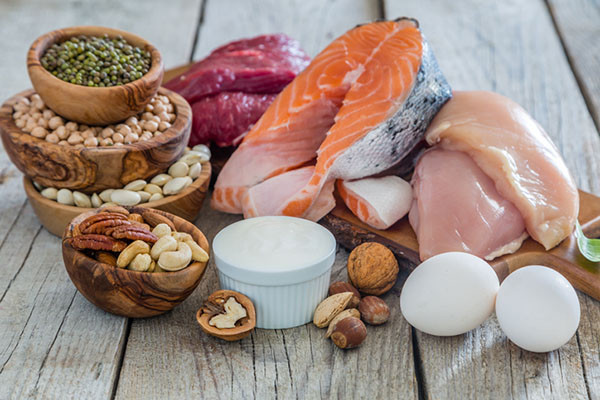Including foods high in protein in your daily diet is crucial for maintaining optimal health and supporting various bodily functions. Protein is not just about building muscle; it’s a fundamental macronutrient involved in countless processes. Understanding what foods are packed with protein and how to incorporate them into your meals can significantly impact your well-being. But what exactly are the best sources of this essential nutrient?
 A colorful and nutritious assortment of high-protein foods, including lean beef steak, fresh salmon fillet, grilled chicken breast, organic eggs, creamy Greek yogurt, and crunchy mixed nuts.
A colorful and nutritious assortment of high-protein foods, including lean beef steak, fresh salmon fillet, grilled chicken breast, organic eggs, creamy Greek yogurt, and crunchy mixed nuts.
Why is Protein Important?
Protein serves as the fundamental building block for numerous components within your body. It’s essential for constructing and repairing tissues, including muscles, organs, and skin. Beyond structural roles, proteins are vital for creating enzymes and hormones that regulate a vast array of biological processes. They play a key role in immune function, helping to defend against illness, and are necessary for the transport of molecules throughout the body. Furthermore, protein contributes to satiety, helping you feel fuller for longer, which can be beneficial for weight management. Ensuring adequate protein intake is therefore essential for overall health maintenance and disease prevention.
Top High-Protein Foods
When it comes to identifying foods high in protein, both animal and plant-based options offer excellent sources. Animal proteins are often considered complete proteins, meaning they contain all nine essential amino acids our bodies cannot produce on their own. However, a diverse range of plant-based foods can also provide sufficient protein and essential amino acids, especially when combined thoughtfully.
Animal-Based Protein Powerhouses:
-
Lean Meats: Chicken breast, turkey, lean beef cuts (like sirloin or tenderloin), and pork loin are all excellent choices. They are not only rich in protein but also provide iron and zinc. Opt for lean or skinless options to minimize saturated fat intake.
-
Fish and Seafood: Salmon, tuna, mackerel, shrimp, and cod are packed with protein and omega-3 fatty acids, which are beneficial for heart health. Choose a variety of seafood to ensure a broad nutrient profile.
-
Dairy Products: Milk, Greek yogurt, cottage cheese, and cheese are good sources of protein and calcium. Greek yogurt, in particular, stands out due to its high protein content. Select low-fat or non-fat versions to manage saturated fat.
-
Eggs: A versatile and complete protein source, eggs provide all essential amino acids along with vitamins and minerals. They are also relatively low in calories.
Plant-Based Protein Champions:
-
Legumes: Beans (kidney beans, black beans, chickpeas), lentils, and peas are nutritional powerhouses, offering substantial protein along with fiber, iron, and other essential nutrients.
-
Nuts and Seeds: Almonds, walnuts, chia seeds, flaxseeds, pumpkin seeds, and sunflower seeds contribute protein, healthy fats, and fiber to your diet. Be mindful of portion sizes as they are calorie-dense.
-
Soy Products: Tofu, tempeh, and edamame are complete plant-based protein sources derived from soybeans. They are versatile and can be incorporated into various dishes.
-
Quinoa: This grain is a complete protein, providing all essential amino acids. It’s also a good source of fiber and minerals.
How Much Protein Do You Need?
The Recommended Dietary Allowance (RDA) for protein for the average adult is 0.8 grams of protein per kilogram of body weight, or 0.36 grams per pound. For a 150-pound person, this translates to approximately 54 grams of protein per day. However, protein needs can vary based on factors such as activity level, age, muscle mass goals, and overall health status. Individuals who are more physically active, older adults, or those aiming to build muscle may require higher protein intake. It’s important to consider your individual needs and adjust your protein consumption accordingly. Consulting with a healthcare professional or registered dietitian can provide personalized guidance.
Animal vs Plant Protein Sources
Both animal and plant-based protein sources can contribute to a healthy diet. While animal proteins are typically complete proteins, plant-based proteins can also provide all essential amino acids when a variety of sources are consumed throughout the day. Focus on the “protein package,” considering the other nutrients and components that come along with protein-rich foods. For example, while red meat is high in protein, it can also be high in saturated fat. Emphasize leaner meats, poultry, fish, and plant-based proteins to create a balanced and heart-healthy dietary pattern. A dietary approach like the Mediterranean diet, which emphasizes plant-based foods, lean proteins, and healthy fats, can be a beneficial model for incorporating protein into a balanced eating plan.
Potential Risks of Excessive Protein Intake
While protein is essential, consuming excessive amounts may have potential drawbacks. Consistently exceeding protein recommendations, especially without sufficient physical activity, could lead to an imbalance in macronutrient intake, potentially displacing carbohydrates and healthy fats. In some individuals with pre-existing kidney conditions, very high protein diets, particularly those rich in animal protein, might pose additional strain on the kidneys. It’s generally recommended that most adults should not exceed 2 grams of protein per kilogram of body weight per day. Maintaining a balanced diet that includes a variety of nutrients is key for long-term health.

